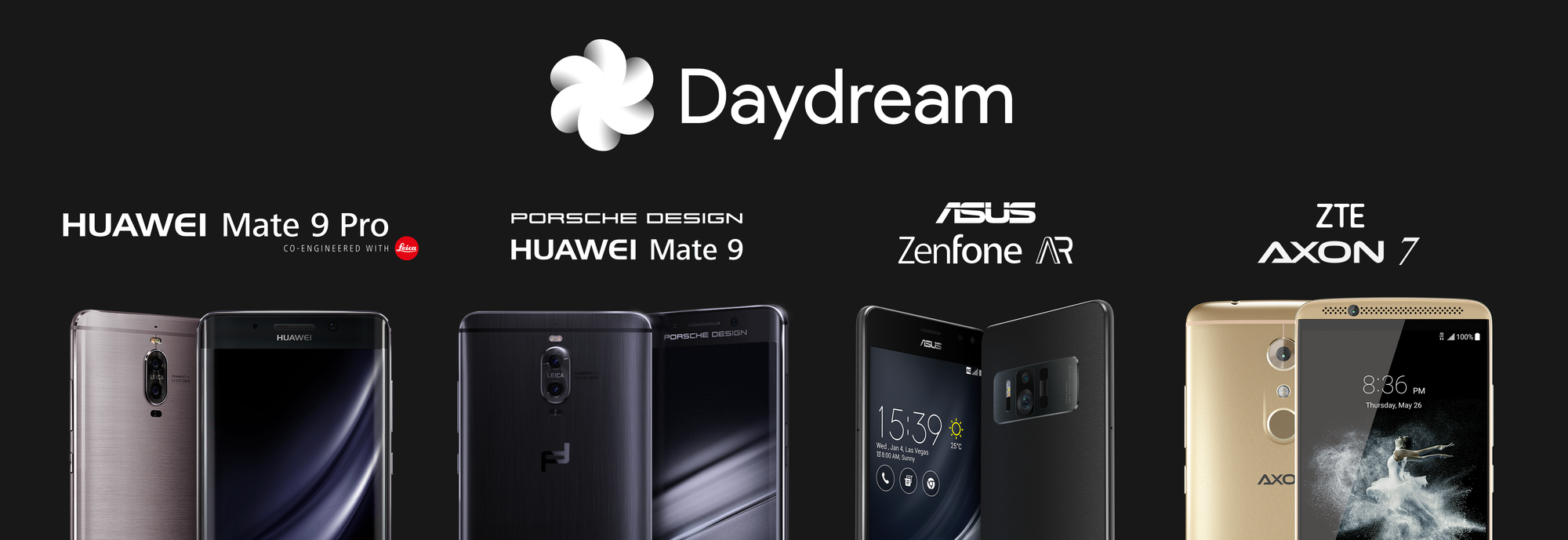Google announced on its blog tonight that four smartphone models that will get the latest Android Nougat update will also come equipped to handle Daydream VR applications. Google showcased four phones from Huawei (2 models), Asus and ZTE (one model each.)
Each of these smartphones will get access to the growing VR/AR content for Daydream, including apps like Lowe’s Vision, which lets you measure your interiors virtually and store them for when you make your home improvement purchases. Google also showcased Slingshot Island, which apparently “turns your phone into a slingshot that hits and destroys dragon eggs on a floating AR island.”
Here’s a snapshot of the smartphone models that will come with Daydream support.
Porsche Design Huawei Mate 9 and Huawei Mate 9 Pro
The Porsche Design Huawei Mate 9 has some ridiculously awesome specs on it. 6GB RAM, 256GB storage, a 4,000 mAh battery, a curved OLED 5.5-inch screen, 20MP/12MP Leica camera hardware and the blazing fast Kirin 960 processor.
The Mate 9 Pro is pretty much the same, without the Porsche Design branding, of course, and starts with a more modest 4GB + 64GB configuration.
Asus ZenFone AR
We’ve covered this phone in more detail in a recent article just after it was announced by Qualcomm at CES 2017. Aside from Daydream, it will also support Google’s Tango augmented reality platform.
ZTE Axon 7
This one’s more of a toned-down version of the other two, and a lot more affordable. It makes sense that Google would want to hit the top end of the market but also reserve something for people who aren’t really keen on spending $700 or so for a smartphone. That’s where the ZTE Axon 7 comes in with its 5.5-inch WQHD AMOLED display with the Snapdragon 820 processor. More than enough compute power for Daydream apps.
With these four smartphone models, Google is pushing its Daydream VR and Tango AR agenda in tandem with its Nougat trump card. The latest Nougat version is something they’re playing close to their chest and only pushing to Pixel or Nexus devices, so it isn’t very clear what updates Google is referring to for these four VR-ready smartphones.
The Daydream app environment is quite sparse at the moment, and even Google only talks about being able to access “dozens of smartphone AR apps.” The store doesn’t seem to be attracting the large pool of talent that the Play Store does. But it’s still early days for VR and AR, so it will take time for the app ecosystem to flesh out and produce some billion-download superstars.
The device side is one of the things slowing down development on the app side, and Google is presumably tying up with these smartphone giants to make sure the devices are out there so it will incentivize developers to put more VR/AR apps into the Daydream repertoire.
As long as supporting smartphones and VR headsets keep coming, the app family will keep growing. It’s just a matter of time now, because several majors like Samsung and Microsoft are also stepping up their activity on the devices side, with Microsoft recently announcing VR headsets based on HoloLens technology but starting at prices as low as $299 from top PC makers like Lenovo, Acer, Dell and HP.
SEE: Microsoft Announces $299 Windows 10 VR Headsets Based on HoloLens Technology
Thanks for reading our work! Please bookmark 1redDrop.com to keep tabs on the hottest, most happening tech and business news from around the world. On Apple News, please favorite the 1redDrop channel to get us in your news feed.



